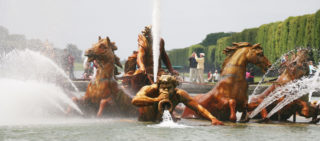Summer Courses
“I love Modern Art, and this course gave me the historical knowledge and the critical thinking skills to appreciate Modern Art. Going to museums as a class was especially insightful, because our professor Nicolas, and his course, made Paris’ extensive modern art collections more accessible.”
– Creed Gardiner, Yale University
CUPA Summer students are enrolled in two courses during their six-week term in Paris : a French course and a content course. Each course carries 45 contact hours, for a total of 90 contact hours, i.e. 2 full semester credit-bearing courses. While students will have the choice between which content course they choose to follow, the French language course will depend on the student’s level. Because CUPA Summer is a French immersion program, all courses will be conducted in French.

The Apollo Fountain at the Château de Versailles
© Olivia BurgessContent Courses
Major Movements in 19th Century French Painting
Beginning with Neoclassicism and covering the movements of Romanticism, Realism, Impressionism, Post-Impressionism and Symbolism, this course follows major movements in French painting of the 19th century as they relate to the expression of the individual and to artistic institutions and conventions. Study of the socio-political context and its influence on the artists, and emphasis on analysis of style, technique, color, and light. Weekly visits on site at museums (Musée du Louvre, Musée d’Orsay, Musée Gustave Moreau)
Postcolonial Paris
This course is a postcolonial approach to the history of Paris and, more broadly, of France. It endeavors to understand the development of the peculiar, intense, and historically conflictual relationship that exists between the French state and ethno-racial and religious minorities. Organized historically, this course will proceed in three parts. First, it will introduce students to the rise of France as a colonial power in the 19th century and the gradual emergence of anti- imperial organizations in the colonial metropolis during the interwar period. Second, it will explore the history of immigration and emigration with a focus on housing and working conditions in the decades following colonial independence. Finally, it will question the political and social stakes of the colonial legacy in France and the social destiny of the “second generation”, notably through the lens of the 2005 riots. Using oral testimonies, novels, films, and photographs, a specific emphasis will be placed on how discrimination and state violence were lived by minorities and how they responded to, and remembered, specific and dramatic events over time.
Language Courses
Advanced Practice of French in a Parisian Context: Language, Culture and Society
For students with 4 semesters of college French (or equivalent), wishing to reinforce their grammar skills and improve their oral and written expression. Students analyze press articles, audio recordings, literary texts, film excerpts, etc., in order to develop a higher level of aural and written comprehension while exploring various aspects of French culture and society. Strong emphasis is placed on helping students acquire better proofreading and editing techniques when writing in French, in order to prepare them for more advanced language courses at their home universities. A number of class-related activities will complement the work covered during class sessions.
Perspectives on Contemporary French Society
This highly advanced French language course is for students who have already completed at least 5 semesters (or the equivalent) of college French, who wish to develop greater proficiency and elegance in their written and oral French. Specific themes will be developed drawing from literary theory, prose texts, theatre, and literary criticism, but also current issues in French society, drawn from press articles and editorials. In depth discussion and debate, coupled with extensive written work, will lead students to elaborate argumentative strategies and a more elegant and precise style in French.
You can download below a sample of last Summer program schedule for a student who had chosen “Paris 1850-1939 : the Birth of Modern Art” & “Perspectives on Contemporary French Society” courses.
As part of their French course and since 2014, students have published their written work on the CUPA Summer Blog.
For the most part, students published texts that they wrote for their French course. However, students were also free to use the blog as a space to share photos, their favorite Parisian spots, and their experiences outside of the classroom.